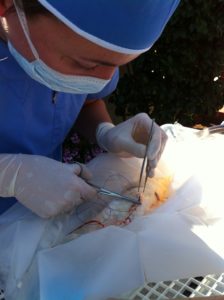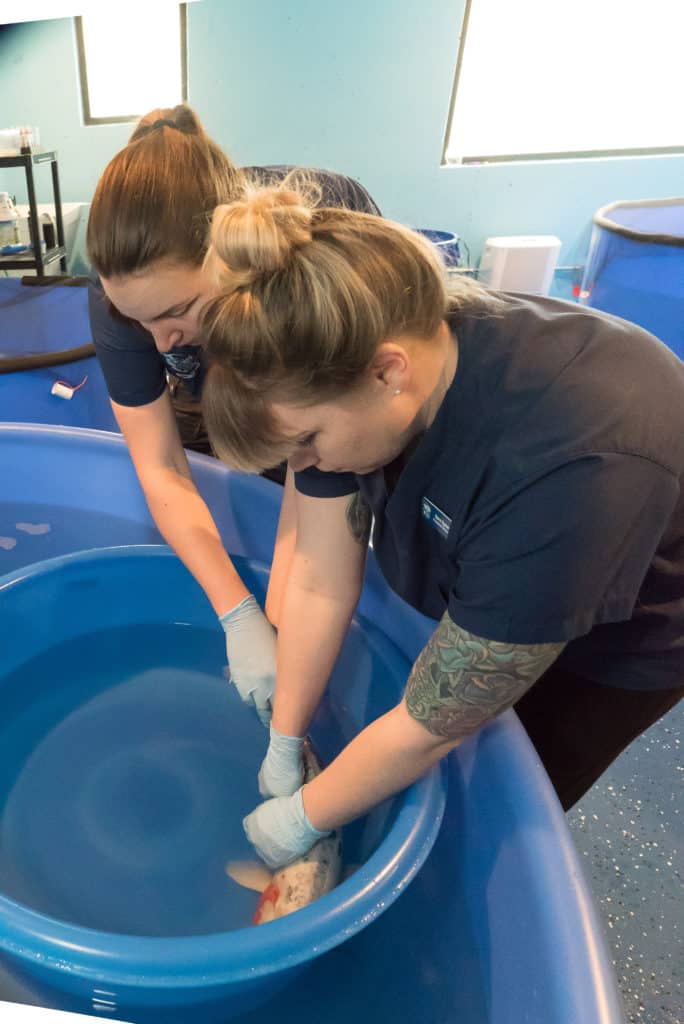Did you know that there are many different types of fish doctors in practice throughout the world? Our small niche in aquatic veterinary medicine focuses on pet fish, but other fish doctors work in aquaculture, regulatory and ornamental industry. Learn all about fish doctors and our unique veterinary field!
What is a fish doctor called?
There are two distinct groups of “fish doctors.” The one that applies to us is an aquatic veterinarian, or an individual who graduated from veterinary school and holds a veterinary license. Ichthyologists are fish doctors who study different aspects of fish biology and physiology and obtained their PhD doctorate.
How do you become a fish doctor?
In order to be a fish doctor, you must complete veterinary school. Training varies between countries, with very few schools here in the US having any sort of aquatic medicine program. Where our chief veterinarian went to veterinary school, Tufts University, she received only TWO hours in fish veterinary medicine in the four years she attended. Thankfully, she was able to supplement her training with summer courses and externships. Learn more about Dr. Sanders’s journey into aquatic veterinary medicine here. As all other veterinarians, once you graduate and have your state license, you are an official “fish doctor.”
Since there is no board certification in fish medicine, YET (AAFV is working on it!), many aquatic veterinarians become Certified Aquatic Veterinarians through the World Aquatic Veterinary Medical Association. This certificate verifies that any veterinarian has taken courses in 9 core competency areas of aquatic veterinary medicine. This program is open to all veterinarians worldwide.

What types of fish doctors are there?
Within the fish veterinary field, there are many types of fish veterinarians. Our veterinary practice specializes in companion animal medicine. Other fish doctors specialize in aquaculture, providing health assessments and care for fish destined for food. Fish veterinarians work in federal and regulatory positions, such as FDA, Fish & Wildlife and NOAA to assist fish in both wild and cultured populations. Ornamental fish veterinarians provide the pet trade with healthy pets while promoting captive breeding over taking from wild stocks. Some fish doctors work in laboratories providing healthcare and conducting research on fish with results that can be passed onto other animal and human research.
What diseases can fish get?
Like all other animals, fish can get sick and are susceptible to many pathogens, including bacteria, fungi, parasites and viruses. There are many diseases in fish that are specific to fish in general, such as aquatic parasites, and others that are species specific, such as Koi Herpes Virus. Unfortunately, there are many fake fish diseases floating around, perpetuated by lack of reputable resources for many fish keepers.
Some diseases, such as Ich or white spot disease, are easily treated when correctly diagnosed. A fish can survive ich when diagnosed early by a qualified professional. Other diseases, such as fungus, are common secondary invaders, taking advantage of sick or weaken fishes. Your fish doctor can provide quick diagnoses and effective treatments without all the stress and hassle of diving down the black holes of the internet. As with all other pets, routine veterinary care is critical to long and healthy fish lives.
If you have a fish of concern, please contact your local fish veterinarian. Our office serves all fish in California and Nevada. We have fish doctor colleagues in Davis and San Diego who may be closer to you. If you are outside of California and Nevada, please visit the American Association of Fish Veterinarians or the World Aquatic Veterinary Medical Association to find a fish veterinarian near you. Email requests are available for our veterinary service, but calls are prioritized (831) 278-1081.


My betta has white protruding tumor on its stomach. I tried lifeguard it doest look its working. Are u older medicine i can provide him. Please contact me at 6264930891
If you are concerned about your fish, please call (831) 278-1081 for veterinary assistance. If you are outside California and Nevada, please visit https://fishvets.org or https://wavma.org
Hi Team,
Need help to save my guppy and I am not able find out the reason. Kindly help me here.
Thank you
If you are concerned about your fish, please call (831) 278-1081 for veterinary assistance. If you are outside California and Nevada, please visit https://fishvets.org or https://wavma.org